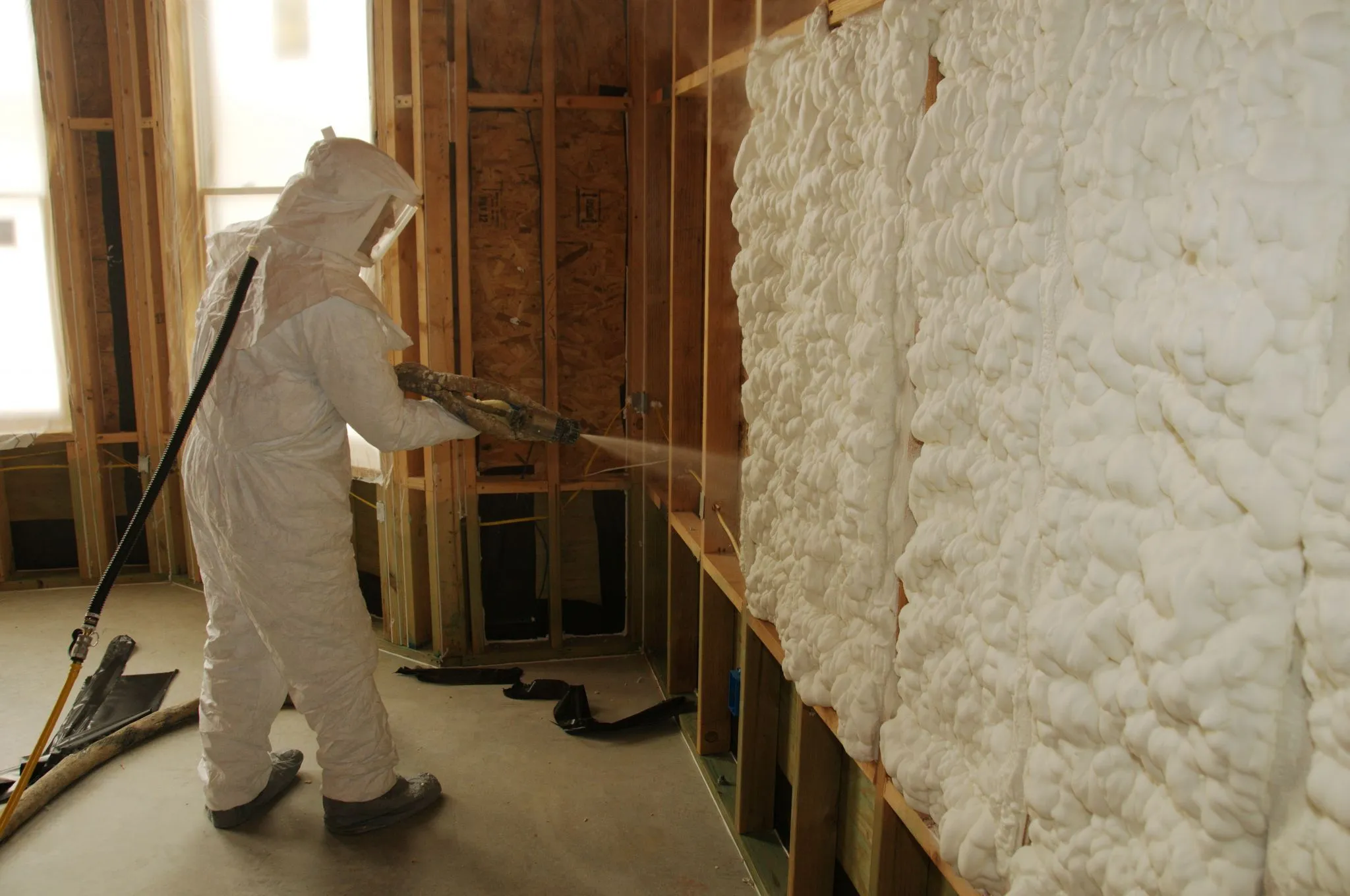Spray foam insulation is a highly efficient solution for improving energy efficiency, reducing noise, and preventing moisture issues in residential and commercial buildings. For property owners in Raleigh, NC, understanding the cost of insulating a 1500-square-foot area with spray foam is essential for budgeting and decision-making. Several factors influence the final price, including material type, labor costs, and installation complexity.
Understanding Spray Foam Insulation Costs
Types of Spray Foam Insulation and Their Costs
Spray foam insulation is available in two main types, each with its own pricing and application advantages:
1. Open-Cell Spray Foam
- Cost per square foot: $0.44 – $0.65 per board foot
- R-Value per inch: Around R-3.5 to R-4.0
- Best for: Interior walls, soundproofing, and budget-conscious projects
2. Closed-Cell Spray Foam
- Cost per square foot: $1.00 – $1.50 per board foot
- R-Value per inch: Around R-6.0 to R-7.0
- Best for: Exterior walls, roofing, high-moisture areas, and improved structural integrity
Material Costs for 1500 Square Feet
The total material cost depends on the thickness of the insulation applied. Below is an estimated cost range based on different thickness levels:
| |Thickness | Open-Cell Spray Foam Cost | Closed-Cell Spray Foam Cost |
| 1 inch | $660 – $975 | $1,500 – $2,250 |
| 2 inches | $1,320 – $1,950 | $3,000 – $4,500 |
| 3 inches | $1,980 – $2,925 | $4,500 – $6,750 |
Factors That Influence Spray Foam Insulation Costs
1. Labor Costs
Labor is a significant component of the overall installation cost. In Raleigh, NC, labor charges typically range from $1.00 to $2.50 per square foot, depending on the complexity of the project and accessibility of the area.
2. Area of Application
- Walls: Easier to insulate, leading to lower labor costs
- Attics & Roofs: Require more safety measures and specialized equipment, increasing the cost
- Crawl Spaces: May need additional preparation, like moisture barriers, adding to the expenses
3. Additional Costs
- Removal of old insulation: $1.00 – $2.00 per square foot
- Permits and inspections: $100 – $500 depending on local regulations
- Air sealing and ventilation improvements: $300 – $1,000
Cost Estimates Based on Area Type
| Application Area | Estimated Cost (Open-Cell) | Estimated Cost (Closed-Cell) |
| Walls | $2,200 – $4,500 | $5,000 – $9,000 |
| Attic | $3,000 – $5,000 | $6,000 – $12,000 |
| Crawl Space | $1,500 – $3,500 | $3,500 – $7,500 |
Return on Investment (ROI) and Long-Term Savings
While spray foam insulation has a higher upfront cost compared to traditional options like fiberglass or cellulose, it provides long-term savings through:
- Energy Efficiency: Reduces heating and cooling costs by up to 30%-50%
- Durability: Lasts over 20 years with minimal maintenance
- Moisture and Mold Resistance: Prevents costly repairs due to water damage
- Improved Air Quality: Reduces allergens and pollutants entering the home
Comparing Spray Foam to Other Insulation Options
| Insulation Type | Cost per Sq. Ft. | R-Value per Inch | Lifespan |
| Fiberglass | $0.40 – $1.00 | R-2.5 to R-3.7 | 10-15 years |
| Cellulose | $0.50 – $1.50 | R-3.2 to R-3.8 | 20-30 years |
| Spray Foam | $1.00 – $1.50 | R-3.5 to R-7.0 | 20+ years |
How to Save Money on Spray Foam Insulation
- Get Multiple Quotes: Compare prices from different contractors.
- Choose the Right Type: Open cells are more budget-friendly, while closed cells are best for moisture-heavy areas.
- Consider Partial Insulation: Insulating key areas like attics and crawl spaces can still yield significant energy savings.
- Look for Rebates and Incentives: Local or federal programs may help offset costs.
Conclusion
The cost of spray foam insulation for a 1500-square-foot area in Raleigh, NC, varies based on foam type, installation complexity, and additional factors. Homeowners can expect to spend between $3,000 and $12,000, depending on the application and materials chosen. The long-term benefits, including energy savings, durability, and moisture resistance, make it a valuable investment for any property.
Get a Professional Quote Today
For an accurate estimate and expert installation, contact Raleigh Excel Spray Foam Insulation today. A professional team can assess your needs and provide a customized solution to enhance your property’s energy efficiency and comfort.
FAQs
How much does it cost to spray foam a 1500-square-foot attic?
The cost to insulate a 1500-square-foot attic with spray foam typically ranges from $3,000 to $12,000, depending on the type of foam used and the thickness of the application.
Can spray foam insulation be installed DIY?
While DIY kits are available, professional installation ensures proper coverage, maximum energy efficiency, and compliance with local building codes.
Does spray foam insulation add value to a home?
Yes, it enhances energy efficiency, reduces utility costs, and can increase property resale value.
How long does spray foam insulation last?
Spray foam insulation can last over 20 years without significant degradation, making it a long-term investment.
Is spray foam safe for homes?
Yes, when professionally installed and properly cured, spray foam insulation is safe and improves indoor air quality.
How does climate affect spray foam insulation costs?
In areas like Raleigh, NC, where summers are hot and humid, closed-cell spray foam may be preferred for its moisture resistance, which may slightly increase costs.
Are there tax credits available for spray foam insulation?
Yes, homeowners may qualify for federal energy efficiency tax credits or local rebates, reducing the overall cost.
How long does it take to install spray foam insulation?
A 1500-square-foot area typically takes 1-3 days to complete, depending on accessibility and preparation requirements.
Does spray foam help with soundproofing?
Yes, open-cell spray foam is particularly effective in reducing noise transmission between walls and floors.
What is the best thickness for spray foam insulation?
A thickness of 2-3 inches is ideal for most applications, balancing cost and thermal efficiency.




